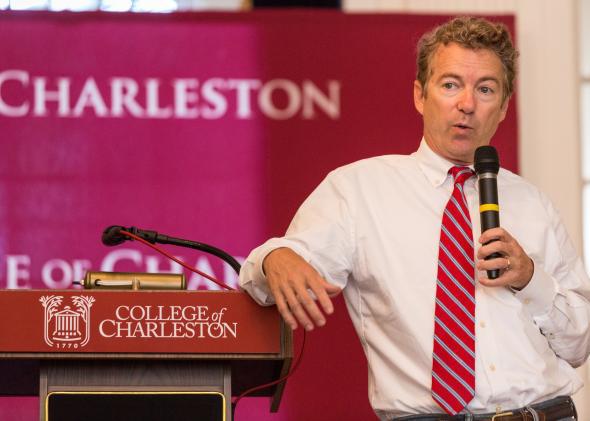Rand Paul formally kicked off his presidential campaign on Tuesday in Louisville, Kentucky, where he warned parents that the American Dream was “slipping away for our sons and daughters.” On Friday, the Republican senator will take the stage at the University of Iowa—his fourth stop on his five-state campaign rollout—to deliver that message directly to America’s youth, a group that the 52-year-old has signaled he’ll put front and center throughout his campaign.
Paul has been laying the groundwork for such a youth-focused pitch since he burst onto the national stage in March 2013 with his drone-themed, Mr. Smith Goes to Washington–style filibuster on the floor of the U.S. senator. When the Wall Street Journal’s editorial board blasted the 13-hour feat of endurance as an empty political stunt designed only to “fire up impressionable libertarian kids in their college dorms”—GOP Sens. John McCain and Lindsey Graham piled on, too—Paul was quick to turn the establishment criticism into an insurgent rallying cry. “We need a different kind of GOP, a party that speaks to the rising generation, who may have unique interests and concerns,” the freshman senator wrote in an op-ed for the millennial-aimed website PolicyMic.
In the two years since, Paul has tried harder than any other national Republican to make inroads with young voters. He’s taken his libertarian-leaning show to college campuses, South by Southwest, and even Snapchat. He’s made reforming the criminal justice system, legalizing medical marijuana, and reining in domestic spying—causes that have proven popular with younger Americans—key pillars of his campaign. Just as important as what he’s been talking about on the stump has been what he’s largely avoided: polarizing social issues, like marriage equality, that tend to send young voters running into the open arms of Democrats.
The problem, though, is that there’s little to suggest all that work is paying off for the jeans-and-blazer-wearing Paul to the degree you might expect.
Strip away the media narrative that Paul’s particular brand of self-described “libertarian-ish” politics will play particularly well with young Americans, and the available polling data suggest that Paul hasn’t actually earned his reputation as the conservative who’s best at luring that group into the GOP tent. In recent national surveys conducted by the Washington Post and CNN, Paul was beat by Jeb Bush among those possible GOP voters 45 and younger and 50 and younger, respectively. A trio of Marist polls in early-nominating states tells only a slightly more exciting story for the freshman senator. Among possible Republican voters under 45, Paul is currently running fourth in Iowa and second in South Carolina—with the lone bright spot coming in New Hampshire, where he currently leads among that demographic.
There’s significantly less polling data on younger subsets of the under 45s, but what is out there does little to make the case for the Man Who Would Be Homecoming King. Paul came in second to Bush in January in a Fusion poll of Americans between 18 and 34, and failed to outshine his fellow GOP hopefuls in a hypothetical head-to-head matchup with Hillary Clinton among that same demographic in a Quinnipiac University survey from last month. It’s not that Paul isn’t popular with a certain subset of young Republican diehards—his performance in the Conservative Political Action Conference straw poll is proof that he is—it’s just that that there’s little evidence that he will be the difference-maker he’s selling himself as when it comes to broadening the GOP’s ranks of college kids and young professionals.
To be fair to Paul, his campaign is currently framed around his ability to attract younger voters, not a declaration that he’s already accomplished that. But it’s clearly not a good sign when a two-year head start on the college circuit doesn’t actually put you out in front. More troubling still is the fact that his job will only get more difficult as the nominating battle ramps up. If Paul hopes to win over skeptical members of the Republican base—an absolute must if he plans to do better than his father did in any of his failed presidential runs—he’ll need to spend more time calling for the repeal of Obamacare and the blocking of the president’s immigration reform, and less time hyping the ideas that made him a hit on campuses in the days before he became an official candidate. The longer the campaign goes on, the more Paul will start to look like the rest of the GOP candidates on the debate stage.
And even Paul’s current tack of avoiding social issues appears unlikely to last through primary season. Already, the cracks are starting to show. Last month at a prayer breakfast in Washington, Paul made headlines when he declared gay marriage to be a “moral crisis.” While that isn’t technically at odds with his stance that the federal government shouldn’t get to say who can and can’t marry, it’s hardly the stuff college kids and young professionals are eager to hear. Nonetheless, Paul’s more likely to walk such claims forward than back on the primary trail.
No one expects the Republican candidate to win the youth vote come 2016. In 2012, President Obama crushed Mitt Romney among voters in their teens and 20s by a whopping 60-to-36-percent margin, and it would be a shock if the Democratic nominee can’t protect the bulk of that lead. Still, with millennials set to account for the lion’s share of the U.S. electorate for the first time ever in 2016, it’s painfully clear to the GOP that the party needs to find a way to compete for more of those votes.
In the end, Paul may still turn out to be the man best suited to do just that, proving himself capable of selling a conservative version of Obama’s hope and change to young voters in the process. But so far the current incarnation of the candidate hasn’t proved he’s likely to be able to pull off such a feat—and it’s hard to imagine the next one will either.
